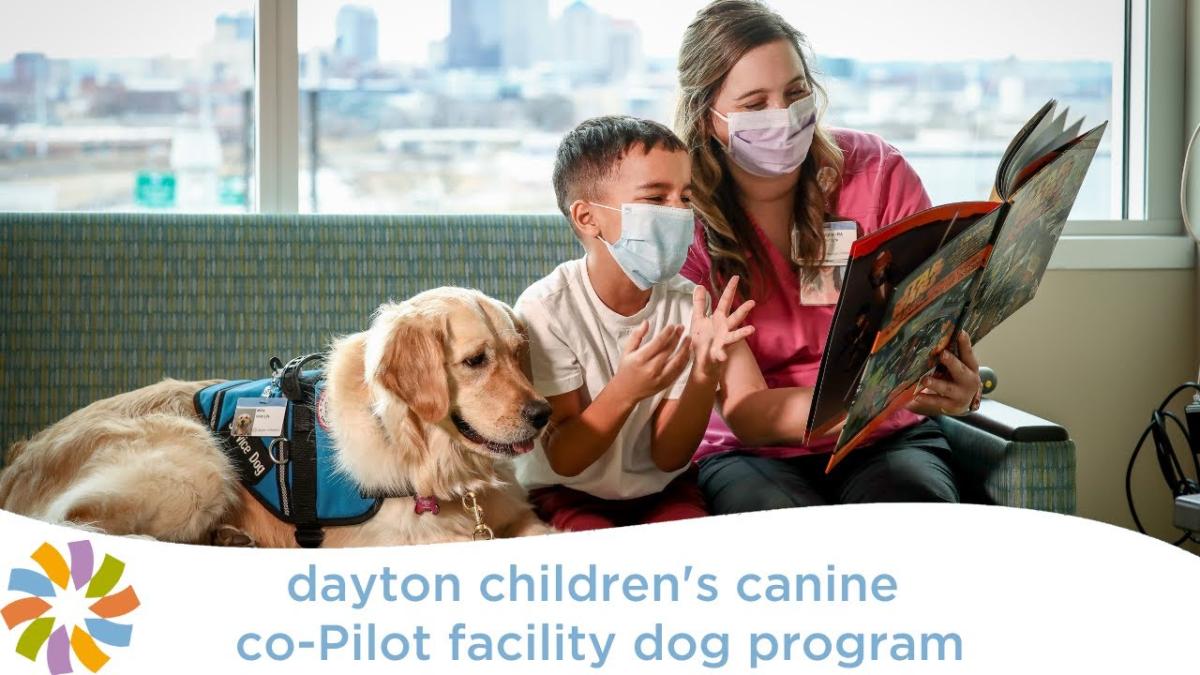programs and services
Cancer treatments are complex and can have significant impacts during treatment and beyond. Dayton Children’s offers programs and services to help support your child’s needs from fertility preservation, to providing comfort and pain relief during treatment, to long-term follow-up care in our survivorship program.
blood and marrow transplant program
Hearing that your child needs a blood or marrow transplant can be scary and overwhelming. We want to make the next step as stress-free as possible. That’s why we have partnered with Nationwide Children’s Hospital for a one program, two campus approach to blood and marrow transplants.
together, we're stronger
Nationwide Children’s is ranked one of the top ten children’s hospitals for treating childhood cancer according to U.S. News and World Report. It is only about an hour away and, the best part, all your care will return close to home at Dayton Children’s once the transplant procedure and recovery are complete.
We work closely together with Nationwide Children’s to create a personalized transplant plan, specific to each child. Your Dayton Children’s care team will guide and support you every step of the way. This includes attending your first meeting at Nationwide Children’s and consistently tracking your progress. It’s the best of both worlds: Your child continues to receive compassionate, familiar care from their team at Dayton Children’s, and will receive expert, personalized transplant care at Nationwide Children’s.
care and comfort program
Children’s Home Care of Dayton Care and Comfort program offers palliative care services to children with life-limiting and terminal illnesses. The staff of Children’s Care and Comfort program understand the needs of children with life-threatening illness and the needs of their families. It is our goal to provide family-centered care that respects the dignity and uniqueness of every child and family.
Our comprehensive services make it possible for families to care for their seriously ill child at home. These include:
- Nurses with pediatric expertise on call 24 hours a day, seven days a week
- Infusion therapies
- Pain management
- In-home blood transfusions
- Intensive family support
- Interdisciplinary team case management
- Coordinator and advocacy with community resources
- A family support specialist is available to provide individualized services including:
- Emotional support
- Parent education
- Sibling support
- Short-term family intervention
- Referrals and resources
- Bereavement support
child life
The hematology/oncology unit has a dedicated child life specialist who focuses on emotional support and developmental needs. The child life staff uses play, preparation, education and self-expression activities to help patients cope with illness, injury, treatment and procedures. They also provide special touches like birthday celebrations and bell-ringing ceremonies at the end of treatment.
<link to bell-ringing video>
Child life also has an extra special tool on their team - facility dogs! These furry friends are specially trained to help support kids in the hospital, from walking around with your child to encourage movement, to laying by your child’s feet to comfort them during a difficult procedure.
Emily’s Beads of Courage:
As your child goes through their cancer journey, beads are provided to help document their journey. Different beads are provided for accomplishments and procedures such as surgery, scans, chemotherapy, blood transfusions, etc.
fertility preservation
Being told that your child has cancer is devastating to both the child and family. Often first thoughts are about treatment which may include surgery, chemotherapy and/or radiation therapy. Although it may not be your first thought, an important part of treatment includes fertility preservation. Preserving your child’s fertility provides hope for their future. It allows them to one day have the family they’ve always wanted. We understand fertility is very important for their quality of life in the years to come.
Even though the number of cancer cases grows each year, the number of survivors is also rising. There is a survival rate of over 80 percent in the pediatric and adolescent population.
At Dayton Children’s we understand how important it is not only to plan the best treatment options with the highest quality care for your child, but to also plan for their future. Dayton Children’s Oncology department has collaborated with SpringCreek Fertility to provide reproductive and fertility options. We also have resources to help with the costs of preservation procedures. Currently there are options in place for both male and females who have reached puberty. We are actively working to provide these services to younger children in the near future.
We are currently able to offer:
- Embryo cryopreservation
- Oocyte cryopreservation
- Lupron injections
- Sperm cryopreservation
If you have questions related to fertility, please call our fertility nurse coordinators: Jani Rice BSN, RN at 937-641-5062 or Kari Roberts BSN, RN at 937-641-4611.
pain management
Dayton Children's pain management program manages a child's pain during common medical procedures like IV insertions and blood draws, which are among the most frequently reported painful events in hospitalized children. No child should suffer when his or her pain can be decreased or relieved.
long-term survivorship program
Dayton Children’s was one of the first hospitals in the country to offer a long-term follow-up program for children who have survived pediatric cancer. This program is available to patients and their families from the time they complete therapy through adulthood. In the last eight years, the number of former cancer patients served by the program has more than doubled to nearly 250, a reflection of our high cure rates.
Patients start participating in the long-term follow-up program approximately five years after finishing therapy. We encourage them to continue coming for the rest of their lives, since some late effects of cancer treatment can show up well into adulthood. We welcome all pediatric cancer survivors, regardless of where they were treated for cancer.
your child’s first visit
Before your child’s first visit to the long-term follow-up clinic, our team will see what testing is needed in advance, if any. This can include bone density testing, cardiac tests, blood tests and others.
Your child’s first visit to the long-term follow-up clinic will take about two hours and will include:
- A thorough physical exam from a pediatric hematologist/oncologist
- A conversation with our nurse coordinator, who will provide a summary of the patient’s cancer care, and information about their personal risk of long-term effects. This information will go home with the patient in a binder they can keep
- A registered dietitian will evaluate the child’s diet and exercise habits and provide guidance about maintaining a healthy lifestyle
- If needed, the pediatric endocrinologist will evaluate your child for any growth or hormone related issues.
- Tests to evaluate any additional problems (if needed)
- Genetics, social work or other counseling can be provided
- Scheduling follow-up appointments
- Referrals for community service
follow-up visits
Patients typically return to the clinic once a year for follow-up care. The nurse coordinator may contact families in advance to recommend pre-appointment testing.



